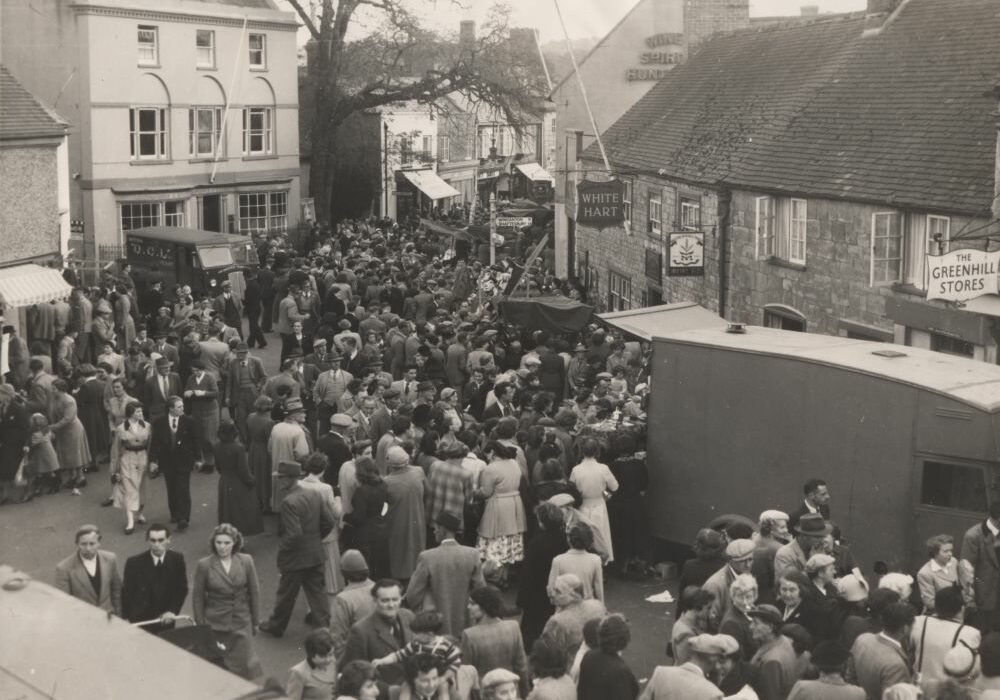By Steve Keenan
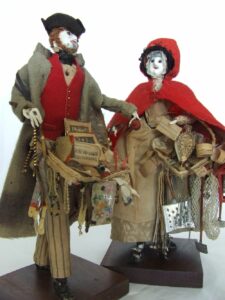
The Pedlar Dolls
Pictures: Josie Sturgess-Mills/Sherborne Museum
The 1930s were the peak of the Sherborne Pack Fair, the highlight of the year when half the town took part, riding in on their bikes while several hundred Gypsies brought their horses in for sale.
“It was a good time for settling old grudges: dozens of windows would be smashed and not many dustbin lids left,” remembers a Sherborne resident.
“A high spot was the fighting outside the pubs afterwards. I can remember seeing two women going at it outside The New Inn – me and all my mates thought that was bloody marvellous. The police cells would be filled for days afterwards.”
The riotous days of the Pack Fair may have passed but the memories are gloriously recalled in a new exhibition at Sherborne Museum: Fairs, Festivals and Markets.
The exhibition touches on other events hosted by Sherborne over the centuries, including the six-day St Thomas Fair (1240-1888) which used to be followed in July by the five-day Gooseberry Fair, which lasted until 1939.
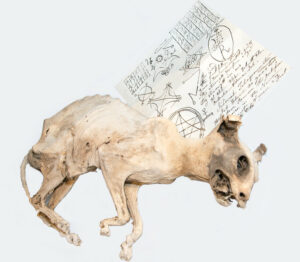
A dried cat found within the fabric of a building in Longburton. These were ritually placed at vulnerable points (hearth, threshold, roof space) to ward off evil. The custom is an ancient one and similar to that of placing shoes and pieces of clothing within buildings. Kids love this and will drag their parents along to see.
But it is the Pack Fair which has outlasted all. Curator Elisabeth Bletsoe said: “Since the mid-1800s, headlines in local papers have crowed ‘Worst Fair Ever’ either in terms of the bad weather, the quality of livestock or the tawdriness of the pedlars’ goods. But the people still loved it. Another resident recently described the day as one of ‘reunion and gathering’ with friends and relatives coming from across the country and meeting up in one of the local pubs. It was, and still remains, full of life and colour, heralded by ‘rough music.’”
The fair was associated with Abbot Ramsam (1475-1504) and was originally a Michaelmas Fair for the hiring of farm hands at the start of the agricultural calendar and, like its counterparts, the sale of livestock.
The word ‘Pack’ from the Middle English literally means a wrapped bundle of goods for travelling; a number of similar items of produce being sold together; a group of people gathered in one place or a person of dubious character.
Pedlars were considered to be the original distributors of the produce of the country, the first free traders.
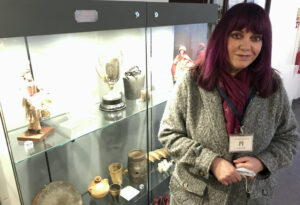
Sherborne Museum curator Elisabeth Bletsoe
The 1841 census listed 97 pedlars operating in Dorset: they travelled the county selling small household goods, brought news and gossip and were as likely to tell your fortune or offer herbal remedies.
Her difference from mainstream society was marked by a red cloak – as seen in a pair of outstanding pedlar dolls in the museum made by C&H White of Portsmouth and dating from 1820.
Elisabeth said: “They are documents of social history as they reveal all the household items and “fairings” that people would buy at the time.
“The heady excitement created by the anarchic arrival of pedlars and travellers was a feature of Pack Monday.”
The museum on Church Lane is currently open on Tuesday, Thursday and Saturday between 10.30am – 4.30pm. Admission is free and donations welcomed. Opening days will extend at Easter. More at: sherbornemuseum. co.uk, 01935 812252.
Families with children on the autism spectrum can arrange to visit between 8.30-10.30am on their own terms. Schools can also arrange visits on Mondays.
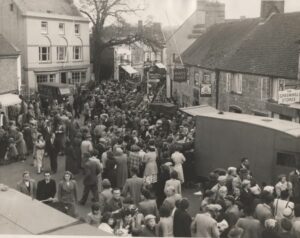
Pack Monday Fair, Sherborne, 1954
Sherborne Museum was effectively closed from early 2020 until November 2021, when it opened briefly before Christmas.
Apart from losing out on an estimated 20,000 visitors and their donations, the enforced break also left volunteers bereft of the ability to help and meet friends. The museum re-opened in January, a month earlier than usual – and the volunteers were the reason.
“We needed to provide them with something to do,” says curator Elisabeth Bletsoe.
Interestingly, the lockdown has encouraged 22 new volunteers to come forward since last summer. And there has been a positive start to the year in terms of visitors.
“It is going pretty well,” said Elisabeth.
“We have had quite a lot of locals who have made some very generous donations.”
Contact: info@sherbornemuseum.co.uk




